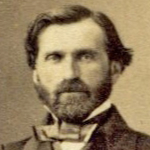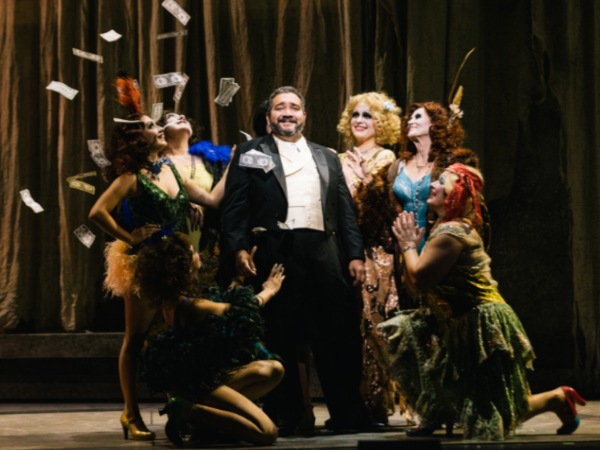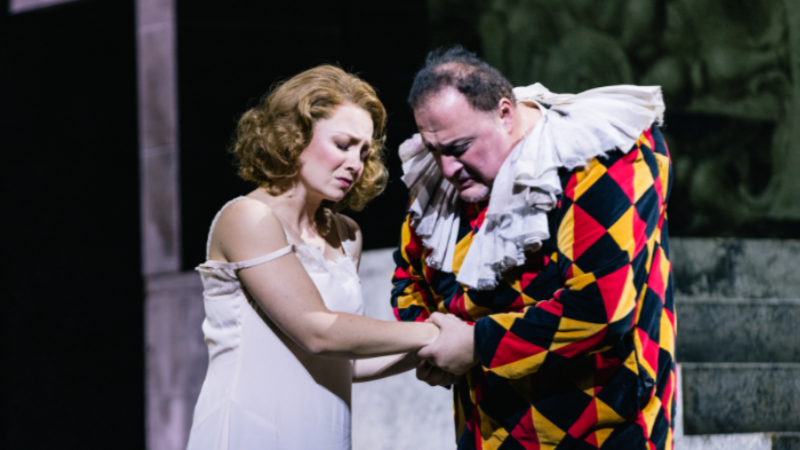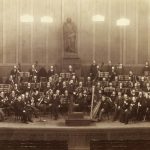October 8, 12, 14 & 16, 2022
Margot and Bill Winspear Opera House
Dallas, Texas – USA
Livestream: October 16, 2022 (via thedallasopera.TV)
Co-production of The Dallas Opera, Houston Grand Opera, and The Atlanta Opera
Scenery originally created for Wolf Trap Opera.
Emmanuel Villaume, conductor; Tomer Zvulun, stage director. Cast: George Gagnidze (Rigoletto), René Barbera (The Duke of Mantua), Madison Leonard (Gilda), Nicholas Newton (Count Monterone), Raymond Aceto (Sparafucile), Nadia Krasteva (Maddalena), Erik Earl Larson (Marullo), Julius Ahn (Matteo Borsa), Malcolm Payne Jr. (Count Ceprano), Alison Bolshoi (Giovanna), Jocelyn Hansen (Countess Ceprano), Courtney Maina (A Page), Armon Golliday (Usher). Creative: Stephanie Havey, associate director; Erhard Rom, set designer; Jessica Jahn, costume designer; Robert Wierzel, lighting designer; Alexander Rom, chorus master; David Zimmerman, wig and make-up designer.
Giuseppe VERDI: Rigoletto
Giorgio Koukl | 18 OCT 2022
In his native Roncole, a small village near Busseto, Italy, only a lonely butcher shop with the name Verdi still recalls the birth of the great master of Italian opera: Giuseppe Verdi.

Giuseppi Verdi
After a heinous elimination from the Milan Conservatory with the now-famous sentence, “He has the hands of a peasant and is so inadequate for a noble position of a musician,” and after many youthful operas with unsatisfactory results, the interim assured Verdi’s firm position in the Italian panorama of operatic composers.
At 38 years of age, the Italian maestro was residing in Milan and well situated at the center of European interest in operatic arts, disturbed in his course toward a definitive coronation as the world’s best opera composer only by a younger but clearly dangerous rival: Richard Wagner.
In 1851, a long-time collaboration with the librettist Francesco Maria Piave once again brought its fruits in the form of a generally well-suited setting within a Mantua court, an appealing story of love, hatred, and treason, and a dramatic development apt to be of immediate interest to Verdi. The result, Rigoletto. Precisely the right material to become a best seller.
Some arias like “La donna è mobile” have such a high impact that Verdi, well conscious of its value, prohibited its use before the first performance in Venice. Well, even then, there were copyright issues.
The first performance was an outburst of success. Only La Traviata and maybe Falstaff can be paired with this triumph, so it is certainly no wonder that Rigoletto is among the most performed works of any operatic composer.
Seeing The Dallas Opera‘s choices for the main singers, the conductor Emmanuel Villaume, the great choice of Tomer Zvulun as director, there was practically nothing in danger of going wrong.
From the orchestra’s first notes, it was clear that this production was destined to be memorable.
The opening scene was conceived in a very spectacular way. Choosing to display the chorus as a menacing row of Mantua courtesans, who in fact are the villains, wearing masks right at the beginning, plunges the public right into the middle of the dark, gruesome mood, as the figure of Rigoletto which slowly emerges. This is definitely a strong moment from the visual side.
Verdi launches the well-known aria “Questa o quella” right at the beginning so that the stage rhythm is clearly defined. Here, as the Duke of Mantua, Vincenzo Gonzaga, the tenor Renè Barbera immediately shines with his radiant voice and seemingly effortless capacity to use the highest register. Barbera sang the aria with outstanding professionalism and ease as he did the even more famous tenor aria, “La donna è mobile.”

Money and admirers: Renè Barbera (center) as the Duke of Mantua. (credit: Kyle Flubacker)
One small problem, at least in the streaming video, was the not-so-well-balanced presence of the choir, which often covered solo voices and even the orchestra. Probably in the theater itself, this was well balanced and so only a minor technical issue.
The Georgian baritone George Gagnidze, today one of the most appreciated Rigolettos in the world, is simply a wonderful choice. He possesses a beautiful capacity for timbral differentiation, is an excellent actor, and his Italian pronunciation is perfect. With his physical stamina, well needed for a character singing more than 55 minutes practically without interruption in the first act only, not to mention the remaining two Acts, Mr. Gagnidze is a dream singer for any opera house.
His daughter, Gilda, sung by soprano Madison Leonard has a very versatile voice. In the beginning, it may seem too light, but very soon, she catches the attention of everybody with her infinite capacity for brilliant coloratura and timbral splendor.

Madison Leonard and George Gagnidze in The Dallas Opera’s “Rigoletto.” (credit: Kyle Flubacker)
Even the minor characters like Sparafucile (Raymond Aceto) and his sister Maddalena (Nadia Krasteva) are well chosen and convincing not only as singers but also as actors.
While very classical, the scenographical solution of a rotating set has the efficacy to create the necessary visual solutions without the need for great changes. Even the hasty solution to transform a Mantua noble palace into a dangerous inn where Sparafucile hosts his victims simply using a piece of cloth becomes an acceptable compromise with the right lighting.
Although usually a nightmare for most theaters, the tempest in the third act was very well resolved and not at all exaggerated.
Conductor Emmanuel Villaume guided the orchestra well. He had the right intuition for tempi and precision of dramatic timings.
The final enthusiastic applause of the numerous Dallas music and opera lovers for the principal soloists was well-merited. ■
• Ed. note: This production of Rigoletto will be coming to The Atlanta Opera in the 2022-23 season.
EXTERNAL LINKS:
- The Dallas Opera: dallasopera.org
- Emmanuel Villaume: emmanuelvillaume.com
- Tomer Zvulun: tomerzvulun.com
- George Gagnidze: georgegagnidze.com
- René Barbera: renebarbera.com
- Madison Leonard: madison-leonard.com
Giorgio Koukl is a Czech-born pianist/harpsichordist and composer who resides in Lugano, Switzerland. Among his many recordings are the complete solo piano works and complete piano concertos of Bohuslav Martinů on the Naxos label. He has also recorded the piano music of Tansman, Lutosławski, Kapralova, and A. Tcherepnin, amongst others, for the Grand Piano label. Koukl has most recently completed recording a second volume of the complete solo piano music of Polish composer Alfons Szczerbinski.
(photo: Chiara Solari)








.png)